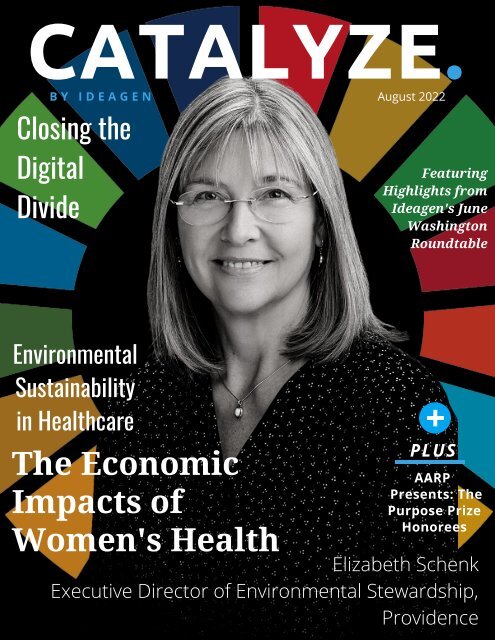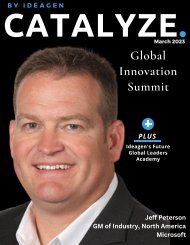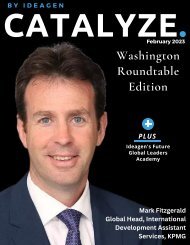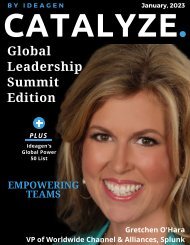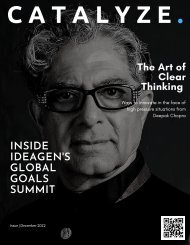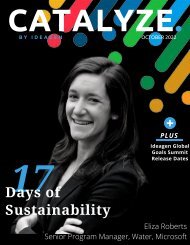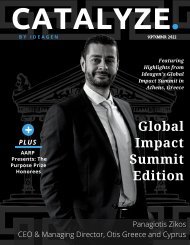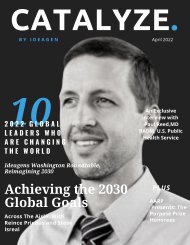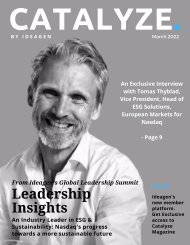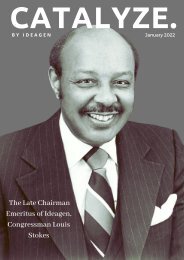Catalyze August 2022
The August 2022 Edition of the Award Winning Catalyze Magazine by Ideagen Global is now available, join the millions of readers who are inspired by the exclusive interviews with global leaders and luminaries from the world's leading companies, NGOs and public sector organizations. Ideagen Global is "Presented Globally by Microsoft" - www.IdeagenGlobal.com
The August 2022 Edition of the Award Winning Catalyze Magazine by Ideagen Global is now available, join the millions of readers who are inspired by the exclusive interviews with global leaders and luminaries from the world's leading companies, NGOs and public sector organizations. Ideagen Global is "Presented Globally by Microsoft" - www.IdeagenGlobal.com
You also want an ePaper? Increase the reach of your titles
YUMPU automatically turns print PDFs into web optimized ePapers that Google loves.
CATALYZE.
B Y I D E A G E N August 2022
Closing the
Digital
Divide
Featuring
Highlights from
Ideagen's June
Washington
Roundtable
Environmental
Sustainability
in Healthcare
The Economic
Impacts of
Women's Health
PLUS
AARP
Presents: The
Purpose Prize
Honorees
Elizabeth Schenk
Executive Director of Environmental Stewardship,
Providence
CATALYZE.
B Y I D E A G E N August 2022
Environmental
Sustainability
in Healthcare
The Economic
Impacts of
Women's Health
Featuring
Highlights from
Ideagen's June
Washington
Roundtable
Closing the
Digital
Divide
PLUS
AARP
Presents: The
Purpose Prize
Honorees
Carolee Lee
Founder & CEO, WHAM
CATALYZE.
B Y I D E A G E N August 2022
Closing the
Digital
Divide
Featuring
Highlights from
Ideagen's June
Washington
Roundtable
Environmental
Sustainability
in Healthcare
PLUS
AARP
Presents: The
Purpose Prize
Honorees
The
Economic
Impacts of
Women's
Health
Dr. Jean Accius
Senior Director of Global
Thought Leadership, AARP
CATALYZE.
B Y I D E A G E N August 2022
Environmental
Sustainability
in Healthcare
Featuring
Highlights from
Ideagen's June
Washington
Roundtable
Closing the
Digital Divide
The Economic
Impacts of
Women's Health
PLUS
AARP
Presents: The
Purpose Prize
Honorees
Jane Oates
President, WorkingNation
CATALYZE.
B Y I D E A G E N August 2022
Closing the
Digital
Divide
Featuring
Highlights from
Ideagen's June
Washington
Roundtable
Environmental
Sustainability
in Healthcare
The Economic
Impacts of
Women's Health
PLUS
AARP
Presents: The
Purpose Prize
Honorees
Grace Koh
Vice President & Head of Government Affairs
Nokia North America
CATALYZE.
B Y I D E A G E N August 2022
Closing the
Digital
Divide
Featuring
Highlights from
Ideagen's June
Washington
Roundtable
Environmental
Sustainability
in Healthcare
The Economic
Impacts of
Women's
Health
PLUS
AARP
Presents: The
Purpose Prize
Honorees
Amb. Patrick Theros (ret.)
Former U.S. Ambassador to Qatar
CATALYZE.
B Y I D E A G E N August 2022
Closing the
Digital Divide
Featuring
Highlights from
Ideagen's June
Washington
Roundtable
Closing the
Digital Divide
Environmental
Sustainability
in Healthcare
The Economic
Impacts of
Women's Health
Sheri Hashemi
Project Team Lead, Boeing
PLUS
AARP
Presents: The
Purpose Prize
Honorees
CATALYZE.
B Y I D E A G E N August 2022
Closing the
Digital
Divide
Featuring
Highlights
from
Ideagen's June
Washington
Roundtable
PLUS
Environmental
Sustainability
in Healthcare
AARP
Presents: The
Purpose Prize
Honorees
The Economic
Impacts of
Women's Health
Steven Tingus
National Disability Policy & Diversity & Inclusion Expert
Actor & Executive Producer
CATALYZE.
B Y I D E A G E N August 2022
Closing the
Digital
Divide
Featuring
Highlights from
Ideagen's June
Washington
Roundtable
PLUS
AARP
Presents: The
Purpose Prize
Honorees
Terri Winston
Founder & Executive Director, WAM
Environmental
Sustainability
in Healthcare
The Economic
Impacts of
Women's Health
THE ECONOMIC
IMPACTS OF
WOMEN'S
HEALTH
CAROLEE LEE - FOUNDER & CEO
WOMEN'S HEALTH ACCESS MATTER
WHAM was created because of a need that I realized existed that hadn't
been fulfilled. And it had to do with the fact that I had built a successful
international brand and women were at the heart of my company, both as
my customers and my employees. They were 85% of my workforce. And I
was an entrepreneur who started at my kitchen table and grew and built a
global brand and eventually successfully sold it. And so I can tell you from
firsthand experience that women's health is an issue that we can't afford to
ignore. And my role led me to think a lot about the economic impact of
women and to see that impact firsthand. And I also saw the ways that
health issues could impact women's finances and their careers and the
effect that illness could have on someone, on their family, on their business.
And it shows in our entire economy. Women are more than 50% of the U.S.
population and workforce and control over 60% of personal wealth. And
they're also responsible for over 85% of consumer spending in the U.S. -
more than $11 trillion - and make over 80% of healthcare decisions. Along
with women driving our economy, our data shows that companies where
women are well represented at the top outperform their peers. Yet women
are still vastly underrepresented in the C-Suite. For example, this year a
record 44 women are running fortune 500 businesses. It's certainly progress
where it's celebrating, but it still means that just 44 out of 500 companies,
or 8.8%, are women led .
CATALYZE MAGAZINE | 1
CATALYZE MAGAZINE | 2
THE ECONOMIC
IMPACTS OF
WOMEN'S
HEALTH
I saw what was happening in the landscape and in the scientific
community in particular and I asked, "What is more important than our
health?" So for example, the OCD's latest report showed that women are
underrepresented in research careers (and to its credit, the OCD now has an
office of sex and gender research). However, across OCD's 36 member
countries, women comprise only around 40% of all researchers and they
are considered to be less likely to be in leadership positions. So I launched
WHAM, a nonprofit nonpartisan organization to increase the awareness of
and accelerate funding for women's health research because women's
health is a societal and economic issue that none of us can afford to ignore.
And although women drive the economy and make the majority of
healthcare decisions across the globe, women are still an under studied
species and continue to be underrepresented in vital health research. How's
that possible? As a business leader, I tend to look at problems with
economics in mind, and I believe that change starts with data. And so it
became apparent to me that we lacked evidence. We lacked data about
the economic costs, benefits, and social impacts of lack of attention to sex
and gender and health research. And that the medical research gender gap
is a major obstacle to not only achieving equity in healthcare, but to
advancing the health and wellbeing of women around the world. As
women globally drive the economy, that gap is holding us all back, which is
why we're grateful that Ideagen is helping us bring this conversation to
light.
GETTING THE
JOB YOU
WANT
JANE OATES
PRESIDENT, WORKINGNATION
Everybody who is having a difficult time getting the job that they want is
somebody that we should concentrate on. But I think if I were to paint a
broad brush, I'd say the two extremes are the most stressed right now. For
those just entering the workforce, whether directly from high school, from a
two-year or four-year degree, or from a professional degree, it's a new world.
And they're having a very hard time getting started mainly because almost
every job listing that I see says three to five years experience. Well, if you did
your job as a student and studied hard and graduated you didn't have time
to have a full-time job while you were doing that. So where did you get that
work experience? Not everybody accepts the fact that you should get an
internship or it would be great to have some kind of work-based learning
experience. It just doesn't exist in every corner of the United States yet.
Maybe we'll correct that soon. And then when I say the book ends, older
workers are having a really hard time. And by older, I mean 50 and older.
Somebody who gets laid off at 50 and was in middle management is having
a really tough time finding a job that pays the same or has a similar job title.
They don't want to go back and start over again. They earned their position
with that old employer. And they want to find a position that's at least as
good in terms of both salary and status. So I think there's a little bit of
discrimination on both ends. When we have AI technology that sorts
resumes, they throw somebody out that could be a great, highly qualified
candidate because they don't have that three years work experience. And
quite frankly, with an older worker, they see that they've been around a long
time and they think, you know, that's not a good candidate because they're
going to come with preset views and maybe too high a salary demand.
CATALYZE MAGAZINE | 3
2022 Winners
Purpose Prize
Learn More
Bill Bracken
You live. You learn. You give back.
No one knows this better than people ages 50
and older, who have spent decades
accumulating a wealth of knowledge that only
life experience can bring. Armed with this
wisdom, they are a powerhouse of innovation
tackling some of the greatest societal
challenges of our time and inspiring others to
do the same.
The AARP® Purpose Prize® award supports
AARP's mission by honoring extraordinary
people ages 50 and older who tap into the
power of life experience to build a better
future for us all.
“AARP is honored to celebrate these
extraordinary older adults, who have
dedicated their lives to serving others in
creative and innovative ways,” said AARP CEO
Jo Ann Jenkins. “During these trying times in
our country and globally, we are inspired to
see people use their life experiences to build a
better future for us all.”
Ify Nwabuku
Raymond Jetson
Rita Zimmer
Alan Miller
CATALYZE MAGAZINE | 4
2022
Purpose
Prize
Fellow
Highlight
Terri Winston
Founder and Executive
Director,
Women's Audio Mission
Support Women's Audio Mission
Learn More
CATALYZE MAGAZINE | 5
S T A R T I N G A N N G O W I T H T E R R I
W I N S T O N O F W A M
Barb Quaintance:
If somebody came to you and said "I want to start my own
nonprofit, not necessarily about music or technology or
anything, but I want to start a nonprofit on something I
care about," what are three things you'd say you'd have to
know this to get started.
From: Terri Winston, Founder
and Executive Director,
Women's Audio Mission
Terri Winston:
I think the three things would be one: you should be an
expert in the thing that you're going to start the nonprofit
about. It's because you need someplace where you don't
need to learn things. Luckily I was an educator for a decade
and I was an audio engineer and a musician for 20 years
prior to that. So I didn't have to worry about that expertise
or convincing people that I had the expertise. I already had
that experience. So that would be one, make sure you're an
expert, at least functionally in the thing you're going to
work on. And I think two: what was a really helpful skill for
me to have was already having written grants and
proposals for my job as a professor, and then things like
knowing what a theory of change is, and being able, to
figure out what the theory of change is for your
organization. That's so simple. There are so many resources
on how to create a theory of change. The first thing it
would do is it would really help your language on what
exactly you are trying to change and then really crystallize
how you're going to do that. So I think that theory of
change piece, and then tie it to kind of like a business plana
strategic plan. Just learn what that looks like. Like what a
SWOT analysis is.
CATALYZE MAGAZINE | 6
CATALYZE MAGAZINE | 7
S T A R T I N G A N N G O
C O N T I N U E D . . .
I think the misconception is that nonprofits don't operate like businesses and that's just not true.
We actually do, we just take the profits and put them back into the organization. So all of those
business skills I think were really helpful to me. I was just, before this call, talking to somebody
who was like, "how do I write grants?" And so I did the same. I told them to look up a theory of
change and look up a basic business plan and just make sure they can do both of those things
for whatever it is you're trying to, to change and start there.
Barb Quaintance:
That's great, that's such a great summary because it indicates you have to have the credibility to
do the work. You can't just say, "I like music, so I'm going to do this," and you have to be
professional. Non-profit does not equal unprofessional. It has to be a professional operation.
How do you measure success in the program? Is it the number of people who come through? Or
something else?
Terri Winston:
That's another thing I should have added. Your question is something like metrics, like, what are
you going to measure? How you are going to measure success is incredibly important for us so
that we can make sure are we serving our communities. Are they happy with it? So we do it
from multiple directions. We obviously are quantitatively measuring success. Like how many
people did we serve this year, as opposed to last year? Are we serving particular communities?
Watch now
CATALYZE MAGAZINE | 8
S T A R T I N G A N N G O
C O N T I N U E D . . .
And then the other half of that quantitative is the qualitative analysis. So we do both internal
and external evaluations of our programs. This could look like surveys in the form of both pre
and post-program surveys. It could be one-on-one interviews with mentors and students to
assess their feelings about the program. Did they consider it a success for themselves? Were
they happy with the instruction they received or the support that they received? Same with all
of our programs, from our conferences to our courses for youth, we are definitely surveying and
always also retooling those surveys. Like, are we asking the right questions? Because we're trying
to get at quantitative, like, are people getting jobs after they're done with this, but also like, are
they happy? Did they feel like this was a great program for them? I think both sides are equally
important. But we do meet monthly and land make comparisons to last month and, how we
are going do by the end of the year?
Watch now
Health For A Better World
Dr. Rod
Hochman,
President of
Providence
HOLLYWOOD
LEGENDS &
BREAKING INTO
THE INDUSTRY
S T E P H E N T I N G U S
Cooper Henderson: What advice would you give someone trying to break into the
Hollywood circle? Be it in inclusion but also on the employment or even acting side, I know
it can be tremendously hard no matter who you are. And I want to take that a step further
and ask you not only what would you recommend of how they break into that, but also
what leadership qualities should someone like that possess?
Steven Tingus: That's a great question. When I started I was doing independent movies. I
always liked to act. I acted in junior high and high school. Then I went into a prior career,
but I would say to work on a crew -being associate producer, helping with wardrobe,
helping with the cameraman. Really learn the specifics of film making, because if you have
that foundation, you are so marketable. I think you've got to start at the bottom. If you
think you're going to come to Hollywood and be a star, then is Hollywood for you? It's a
job. Let's face it; It's a job. And it doesn't mean that you're going to do a lateral movement
from acting to producing. I'm a member of the TV academy because of my work, because
I've done everything already in my 12 years prior, but what I would do and what I hope
others will put in the forefront is to be a part of a project that tells a message, because the
more stories and positive and difficult messages that we get out there in TV and film, the
more people learn about others. So I would first do some independent work, get a talent
agent like I have, and then you're able put your resume out there for entry level jobs.
Because if you're applying to a studio that I'm very close to, like ABC, Disney, or others,
you've got to start at the bottom. And if you have it, they'll recognize it.
CATALYZE MAGAZINE | 10
The Impact of
Globalization on
Diplomacy
AMBASSADOR PATRICK THEROS (RET.)
FORMER U.S. AMBASSADOR TO QATAR
Daniel Kerns:
In your opinion , what do you think is one of the most important aspects to
consider when you're trying to interact with individuals that may be from
different areas of the world, but you're trying to form the same symbiotic
relationship together .
Amb. Patrick Theros:
You need to know what it is that affects the interests of the other country.
You need to know what affects the practical interests of the other country.
And you need to know what affects the, for lack of a better term, irrational
interests of another country. Just because war is far more dangerous and far
more destructive to the world as a whole doesn't unfortunately make us
think that everything is sort of automatic, make us think that it's
mechanical or just a well oiled machine working and that we can approach
every issue objectively rationally. We can calculate, we can feed all the
inputs into a computer and the computer will kick out how it is that we can
overcome these problems. What we have not yet figured out is how to deal
with what we think is irrational on the part of the other guy and what the
other guy thinks is irrational on our part. And you see this over and over
again: we have a disagreement with somebody and we tell him that this is
the way the world operates.
CATALYZE MAGAZINE | 11
CATALYZE MAGAZINE | 12
The Impact of Globalization on
Diplomacy Continued...
This is where the money is, so you're going to have to join it. And the other
guy sees this as an attack on his dignity. A good example in the United
States is that we never truly internalized the effect of globalization on
American industry. American factories were not being modernized because
it wasn't profitable to. It was more profitable to shift the production of
those factories to other countries or to cheaper parts of the country. There is
a cost to this. The cost is the 10,000 guys who work at the factory in
Youngstown, Ohio. They're out of a job. An economist will sit there and say,
well you can retrain them. They can move to places where there are jobs.
Nonsense. You can't retrain somebody who's been working the same job for
40 years. You can't ask somebody to move from Youngstown, Ohio to
Atlanta, Georgia, because the house that he owns in Youngstown, Ohio has
just lost all its value and he can't sell it for anything. These are intangibles
that you have to account for. I'm using globalization as this shrinking of the
world. And as for geography, I think in some ways, geography has not
become less important. Knowing geography is even more important
because now you're closer to everybody else. When you're fishing in your
waters, you're killing, you're affecting the fishing in the next country's
waters. When you're dumping, pollution into the Gulf Stream ends up in
Norway. I think our biggest problem right now is that education has not
caught up with the changes in the world and particularly human
education, not STEM, not science, not technology, not math, but the kind of
education that teaches you the history and teaches how to deal with other
countries. That has not caught up yet.
IDEAGEN GLOBAL IMPACT SUMMIT
Streaming September 8th on Ideagen TV
Ideagen Global "Presented Globally by Microsoft"
and in collaboration with ACS Athens and
ALLILON.net and supported by the American Hellenic
Institute is pleased to present the Ideagen Global
Impact Summit in Athens, Greece with this global
forum for audiences across the planet.
This summit highlights the importance of creating a
sustainable future from both a personal perspective
and a societal one through impactful leaders in your
community. Broadcasting on the Ideagen TV Network,
including Ideagen Radio and Catalyze Magazine.
In Collaboration with:
Presented Globally by
Microsoft
CATALYZE MAGAZINE | 13
THE IMPORTANCE OF
DIVERSITY IN STEM
S H E R I H A S H E M I
I am wholeheartedly behind and work towards
sustainable development goal five - empowering
women and girls. I was just looking up the
numbers, and I have a few friends in the research
program with me who are focusing on women as
well as diverse candidates. I think it's like 25-28% of
the STEM - science, technology, engineering, math
- community and occupations that are female. And
so that's such a small number if you think about
what ideas are held by individual people and
personalities and perspectives. So you're really just
getting a
limited perspective on how folks view those lenses, like how you look at a problem.
You're only getting 25% of your possible input. Maybe there are more solutions in
there. Getting candidates of diverse nature and of diverse backgrounds and
perspectives and education and experiences is a really great way of tackling some
of these problems because when you look at a problem for so long, it just inherently
becomes part of the problem. And you might just forget to tell somebody, so when
you get into a new experience with someone who's not necessarily familiar, you
share that perspective, and those elements that might get missed or assumed can
resurface and come back. So these problems fuel more sustainable sources as folks
are really pushing the envelope on commercial space flight and putting people into
lower earth orbit. I really believe that there's a subset of those solutions, and they're
in those folks' heads who were not necessarily being able to incorporate them. And
by going after that and through sustainable development goal five empowering
women and girls, you're going to end up helping elevate and increase that
perspective to solve those problems.
Watch now
CATALYZE MAGAZINE | 14
CATALYZE MAGAZINE | 15
ENVIRONMENTAL
SUSTAINABILITY
IN HEALTHCARE
Beth Schenk
Executive Director of Environmental
Stewardship
Providence
Our problem with fossil fuels is two-pronged, or at least the solutions are.
One is efficiency. We are committed to ringing out as much inefficiency as
we can. We have a bigger challenge with natural gas. So natural gas is
something most of our hospitals - all but one today - are built around for
our heating and cooling. HVAC is dependent on our boilers and natural gas.
We're not going to be able to just eliminate those overnight. And also, we're
dependent on that kind of reliable fuel for healthcare. We have to have
backup systems and redundancy. So natural gas is a challenge, but we still
hope we can decrease our natural gas use by 10 to 15% through what we
call deep energy retrofits. Those are looking at, through energy audits at
each site, what are the areas where we have the most opportunity for
improvement and working on those over time. We were fortunate to get
approved last year for the first time for a green revolving fund, which is an
internal funding mechanism such that dollars are set aside and, put toward
these energy efficiency steps. And then we capture through our scorecard
how much energy that actually saves and how much money that saves over
a seven-year period. And then we reinvest that in future energy efficiency.
ENVIRONMENTAL
SUSTAINABILITY IN
HEALTHCARE CONTINUED...
Now electricity is another side of the energy coin. And we feel like we have a lot
more opportunity there compared to natural gas. We're working on that from all
the ways that people are with some other more creative ways. LED lighting. We've
got to do that. We're behind the ball if we're not taking care of that. Our building
envelopes, of course, with our new construction, increased pump and fan
efficiency, just the basic nuts, and bolts of energy efficiency work setbacks so that
we can automaticallyturn off parts of our buildings when they're not in use.
Otherwise, they just run very high energy use 24/7. Let me give you another
example of some really good work, some of which has been around for 30 years on
some of our sites: groundwater cooling. There's one hospital that has had
groundwater cooling since 1992. It pumps water out of the ground from a very
cool aquifer (48 degrees) and uses that to run through our chiller and chills the
whole building all summer long. It saves all that electricity and is injected back
into the aquifer with no pollution added. It's a closed loop system. We're installing
more of those now because they have been so successful. It decreases our need for
electricity through a renewable source. But the other thing that's really important
for electricity is identifying renewable electricity. Like I said, for natural gas, we
don't have as many options, but for electricity, we certainly do. And we're doing
that too from - onsite to our green tariffs - with our utilities to power purchase
agreements and virtual power purchase agreements. And with that, we intend to
get to 100% renewable electricity by 2030.
CATALYZE MAGAZINE | 16
Global Leader Academy
P R E S E N T E D B Y I D E A G E N
I D
E A G
E N G
L O B A
L . C O M
P R E S E N T E D G L O B A L L Y B Y
M I C R O S O F T
CLOSING THE DIGITAL
DIVIDE
GRACE KOH
VICE PRESIDENT & HEAD OF GOVERMENT AFFAIRS
NOKIA NORTH AMERICA
Grace Koh: Technology is incredibly critical to sustainability in particular,
and also obviously to inclusivity and closing that digital divide. Let's talk
about it first from the Nokia standpoint. Nokia is completely committed to
the SDGs. They are committed not only to reducing their own carbon
footprint but also to producing equipment that will help other companies
reduce their carbon footprint. But then there's a third layer that goes on
further where the equipment that we help deploy 5G can actually also help
societies minimize our footprint by helping us allocate resources better and
direct our planning and resources into the right places. So that can help us
use less and target the people that need it the most, making sure that they
are getting the help that they need. So technology can help us reach our
SDGs in a significant way. Nokia is committed to being part of that.
George Sifakis: That's incredible. You mentioned 5G having this impact.
How does the obverse of this happen? How does technological inequality
impact communities and the overall achievement of these global goals?
How does that happen?
CATALYZE MAGAZINE | 18
CATALYZE MAGAZINE | 19
CLOSING THE DIGITAL
DIVIDE CONTINUED...
Grace Koh:
Think about the pandemic. That was
a lesson for all of us. I mean, if you
didn't have broadband, you weren't
able to go to work. You weren't able
to go to school. One of the worst
things I heard and saw during the
pandemic was unemployment offices
that were not online. You had people
standing outside in line at these
unemployment offices, masked or
whatever else, standing six feet apart,
spending the whole day because the
staff there was already overloaded
and unable able to provide the
services they needed. What if all of
GRACE KOH
VICE PRESIDENT & HEAD OF
GOVERMENT AFFAIRS
NOKIA NORTH AMERICA
this were put online and actually
done in a way where adoption was no
longer just skin deep but really
penetrated down to the very function
of the organization? That's where we
need to go.
CREATING RIPPLING
EFFECTS IN AN AGING
WORKFORCE
DR. JEAN ACCIUS
SENIOR VICE PRESIDENT OF GLOBAL THOUGHT LEADERSHIP
AARP
George Sifakis:
What are some of the most pressing issues that those individuals over 50 are facing
today?
Dr. Jean Accius:
First of all, thank you so much, George, for being a card-carrying member of AARP.
Hopefully, we are doing you a service and representing you well. You are an amazing
example of how aging, particularly in the U.S., looks good. And as I tell people all the
time, as you get older, there is wisdom, experience, and value that comes with that. So
embrace it. With respect to some of the major issues that I know and think we're all
grappling with, particularly in this current climate as it relates to the impact on people
over the age of 50 in the U.S., there are clearly huge economic implications. We're seeing
increases in terms of inflation and increases in terms of the cost of goods and services,
which disproportionately impact those that have a limited and fixed income. So really
thinking about the opportunities to ensure that people have the economic means to
match their life aspirations is something that we're doing very intentionally at AARP. The
Keep Reading at
other area that is of critical importance for people over the age of 50 -and frankly for
workers of all ages - is really thinking about the changing labor market and whether it's
IdeagenMember.com
the Great Resignation, the Great Reshuffle, the Great Reflection, the Great Reorientation;
whatever the Great is, what we do know is the fact that a lot has changed over the last
two plus years and counting, and we need to think about how we leverage the skills and
the insights and the wisdom of a multi-generational workforce. Many companies are
managing five generations at any point in time.
CATALYZE MAGAZINE | 20
CATALYZE MAGAZINE | 21
CREATING RIPPLING EFFECTS IN AN
AGING WORKFORCE CONTINUED...
Those companies who are able to leverage that age diversity are those companies that
are going to be more competitive in the marketplace. We also know that age
discrimination is rampant. We've seen that accelerate, particularly since the pandemic.
In fact, we've been doing a survey for many, many years, and nearly 75% of those
respondents indicated that they've seen or experienced age discrimination, particularly
in the workforce, which is one of the highest numbers since we've been actually
collecting this data. So whether it's the economic implications in terms of exactly what
we're seeing, which has a ripple effect in terms of the workforce and a lot of the shifts
that we're seeing in the workplace, and even in some cases, people returning back to the
labor market because of the cost of living has increased so significantly or the age
discrimination that exists, which is stifling economic growth for all of us, we have some
major issues to address in addition to the financial and the workplace issues that I just
mentioned. We also have to grapple with some of the inequities, and I'm going to refer to
inequities in a couple of ways. One is the fact that not only is the population aging, but
we also know that in many cases, people are living much longer. Now, what we also
know is that just because someone is living much longer, their ability to live those extra
years in good health has not kept pace. So in other words, we are seeing an increase in
life expectancy, but we're not seeing an increase in healthy longevity. So you have this
huge gap. So how we start to address those inequities within and across the globe is a
huge issue that we're going to have to grapple with.
QUANTUM
LEADERSHIP
PODCAST
SEPTEMBER 2022
I D E A G E N ' S P O W E R 1 0 L I S T
10 global leaders who are Changing the World in 2022
Mark Fitzgerald
KPMG
Barb Quaintance
AARP
Steve Israel
Michael Best
Strategies
Dr. Sidhant Gupta
Microsoft
Tomas Thyblad
Nasdaq
Microsoft
Ashley Haynes-Gaspar
Peggy Pelonis
ACS Athens
Jake Herway
Gallup
BJ Moore
Providence
Nick Larigakis
American Hellenic
Institute
CATALYZE MAGAZINE | 23
Editor's Note
Dear Ideagen Global Friends and Colleagues,
As we prepare for the September 8th release of the Ideagen Global
Impact Summit and 17 Days of Sustainability in October, Ideagen
Global continues to maximize our efforts with a relentless commitment
to convene the world's greatest minds from the world's leading
companies, NGOs, and the public sector to address the world's most
vexing issues. In 2022, Ideagen TV content will again reach over 100
Million People across the planet with our ubiquitous content
distribution, including inspiring interviews and custom programming to
create awareness and Global Partnerships to Achieve the Goals.
2022 is already an #EPIC year with high-impact hybrid/live events
across the planet, including Athens, Greece, New York, and many other
global destinations! Join the movement at IdeagenGlobal.com for all of
the latest updates.
Sincerely,
GEORGE SIFAKIS
GEORGE SIFAKIS
Editor-in-Chief & CEO
Ideagen
CATALYZE MAGAZINE | 24
COOPER HENDERSON
Lead Publication Editor
DANIEL KERNS
Co-Editor and Chief of Staff
WILL MARTIN
Co-Editor and Senior Fellow
Pictured Top to Bottom
Microsoft's Tilemachos Moraitis
ACS Athens's Peggy Pelonis
Amb. Angelos Pangratis (ret.)
Top Left: Ideagen's Global Impact Summit
